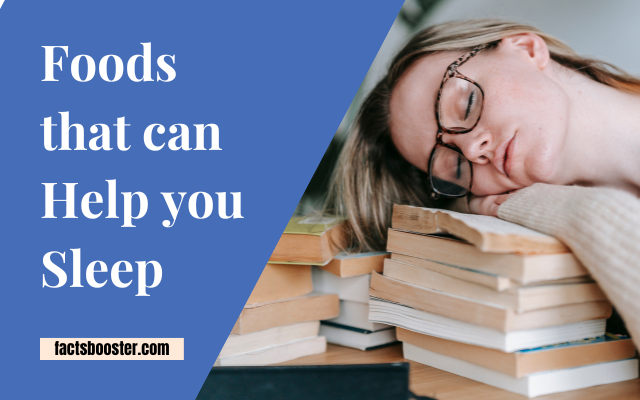As I’ve entered middle age, I’ve consistently noticed a decline in the quality of my sleep. During my quest for information, I came across a common issue that many people share – insomnia. Today, I’d like to discuss foods that can aid in improving sleep and explore strategies to overcome insomnia, ultimately achieving a healthy and restful night’s sleep.
Read more:
Insomnia problem
According to the World Health Organization (WHO), a minimum of 10% of adults globally experience sleep issues, with insomnia ranking among the most prevalent sleep disorders. While insomnia may not have immediate effects, over time, it can lead to various health issues. Beyond physical problems, it also imposes a psychological burden. (1)
What foods can help you sleep

Certain foods contain sleep-promoting nutrients that can facilitate easier sleep onset and enhance sleep quality. Which foods support better sleep? Here’s a list of sleep-inducing foods:
1. Almonds
Almonds are rich in magnesium and protein, which help reduce anxiety and stress and promote sleep. In addition, almonds are very high in melatonin, which can help regulate sleep. Eating some almonds at night can help you sleep, but remember not to eat too much.
2. Dark chocolate
Dark chocolate is rich in cocoa, a natural substance that contains heart-healthy compounds that also help relax the body and promote sleep.
3. Chicken
Chicken is rich in vitamin B6, which helps the body produce melatonin and promotes sleep.
4. Fish
Deep-sea fish, such as salmon, tuna and trout, are rich in Omega-3 fatty acids. These substances can help reduce anxiety and depression, regulate serotonin, and help improve sleep quality.
5. Honey
Honey contains glucose, which stimulates the release of serotonin in the body, helping you fall asleep more easily.
6. Bananas
Bananas contain magnesium and potassium, which help relax the body and promote sleep.
7. Oats
Oats contain high amounts of melatonin, a hormone that helps regulate sleep.
Diet is only one factor that promotes sleep. There are other aspects that also affect sleep, such as sleep environment, sleep time and sleep habits.
What drink can help you sleep
In addition to food, we should also drink some drinks that can help sleep, such as:
1. Dark chocolate
Dark chocolate is rich in cocoa, a natural substance that contains heart-healthy compounds that also help relax the body and promote sleep.
2. Tea
Green and herbal teas, rich in natural antioxidants and sedatives, help relax the mind and body, relieve anxiety and stress, and promote sleep.
3. Cherry juice
Cherry juice contains melatonin, which helps regulate sleep cycles and improve sleep quality.
However, different people have different physiques and food preferences, and the food that suits them is the best. In addition, in addition to diet, we must also maintain a regular schedule and establish a comfortable sleeping environment.
Which vitamins help with sleep troubles?
If your trouble sleeping is caused by a deficiency in a specific vitamin, supplementing with that vitamin may help. Here are a few vitamins that may be beneficial for improving sleep:
Magnesium
Magnesium helps relax your body and brain, helping you sleep. You can get magnesium through food or supplements, such as green leafy vegetables, legumes, nuts, whole grains, seafood, and magnesium supplements.
Vitamin B6
Vitamin B6 is an important vitamin that promotes melatonin production in the body. Melatonin is a hormone that regulates sleep. You can get vitamin B6 through food or supplements, such as chicken, fish, bananas, potatoes, and vitamin B6 supplements.
Vitamin D
Vitamin D is important in promoting healthy sleep because it is involved in the production and regulation of melatonin. You can get vitamin D from sun exposure, food, or vitamin D supplements such as mushrooms, cod liver oil, eggs, and vitamin D supplements.
Melatonin
Melatonin can regulate the body’s circadian rhythm, making people feel sleepy and falling asleep faster. Eat more melatonin-rich foods, such as sour cherries, eggs, oats, fish and nuts, which are all good sources of melatonin supplements. (2)
However, it should be noted that while supplementing vitamins, you should also have good sleeping habits and improve your sleeping environment. If your sleep problems persist, be sure to talk to your doctor.
Melatonin vs sleep
Melatonin, a hormone produced by the pituitary gland, is crucial in governing the body’s circadian rhythm. Its levels rise at night, promoting drowsiness and facilitating sleep. The secretion of melatonin is influenced by ambient light, dimming in response to darkness. Therefore, creating a conducive sleep environment, such as avoiding bright lights and electronic devices before bedtime, aids in melatonin release, enhancing sleep quality.
Beyond its role in regulating sleep, melatonin also impacts the immune, cardiovascular, and nervous systems. Studies suggest potential antioxidant, anti-inflammatory, anti-tumor, and anti-aging effects.
While melatonin supplements can boost levels, it’s essential to consult a doctor before use. High-dose supplementation may lead to adverse reactions and interactions with certain medications.
What foods and drinks can keep you awake?
Some foods and drinks may disrupt sleep and make it difficult to fall asleep or maintain a good night’s sleep. Here are some foods and drinks that may disrupt your sleep:
Caffeine
Caffeine, found in coffee, tea, cocoa and some soft drinks, stimulates the nervous system and keeps people alert and awake. If you drink caffeinated drinks at night, it may make it harder for you to fall asleep.
Alcohol
Alcohol makes people feel relaxed and sleepy, but it may interfere with the quality and duration of sleep. Alcohol interferes with sleep cycles, causing a person to experience more light sleep rather than deeper, restorative sleep.
Spicy foods
Eating spicy foods may cause an increase in stomach acid, making it difficult to sleep. Additionally, spicy foods may cause discomfort and make it difficult to fall asleep.
High-fat foods
High-fat foods may cause digestive problems and stomach upset, and reduce sleep quality.
Refined starch
Foods with refined starches digest rapidly, leading to a sharp rise in blood sugar levels and heightened arousal, impacting the ability to fall asleep and sleep quality. This heightened state releases adrenaline and other excitatory substances, hindering entry into deep sleep. Moreover, elevated blood sugar can constrict blood vessels, impeding circulation and further disrupting sleep.
Drink too much water
Drinking too much water may cause you to have to get up frequently to go to the bathroom, which can interfere with your sleep. Therefore, you should avoid drinking too much water a few hours before going to sleep.
Avoid this before going to bed
To promote good sleep, there are some things you should try to avoid before bed, including:
1. Eating & drinking too much
Overeating at dinner or drinking alcohol will increase gastrointestinal burden and affect sleep quality.
2. Intensive exercise
Intense exercise can elevate the body’s excitement levels, increase the release of stimulating substances such as adrenaline, and make it challenging to fall asleep. If you’re limited to exercising after work, try to do so as early as possible and steer clear of overly strenuous workouts.
3. Psychological stress and arousal
Viewing thrilling or argumentative content can influence and stimulate individuals, making it challenging to unwind and drift into sleep.
4. Drinking stimulating drinks
Beverages containing caffeine and other excitatory substances, such as coffee, tea, and cola, can make people excited, nervous, and affect sleep.
5. Excessive use of electronic devices
Electronic devices such as TVs, computers, mobile phones and other screens produce blue light, which inhibits the secretion of melatonin, interferes with the body’s biological clock, and affects falling asleep and sleep quality.
Ways to help you sleep
What are some techniques to improve sleep? The following methods can aid in achieving better sleep.
1. Improve sleep environment
Maintain a tranquil, cool, and dark bedroom environment, steering clear of noise, bright lights, and extreme temperatures.
2. Establish good sleep habits
Establish a consistent bedtime and wake-up schedule each night, and maintain a stable sleeping environment and position.
3. Relax
You can unwind your body and mind, alleviating stress and anxiety, through practices like meditation, deep breathing, yoga, and other methods.
4. Avoid stimulating foods
Avoid drinking coffee, tea, alcohol and other stimulant drinks in the evening, as well as irritating foods.
5. Increase physical activity
Appropriate physical activity can help relieve physical fatigue and promote deep sleep, but do not do strenuous exercise before going to bed.
6. Maintain a good mental state
To avoid excessive anxiety, worry or irritability, you can relax by reading, listening to soft music, etc.
7. Use melatonin
Melatonin, a natural sleep aid that assists in regulating sleep rhythms, should only be utilized under the guidance of your doctor.
Exercise to help you sleep
Engaging in moderate exercise can alleviate physical fatigue and encourage deep sleep. Here are some exercises to assist with sleep:
Walking
Walking is a very good form of exercise, which can help the body fatigue and promote sleep. Walking after dinner can also help digest food, promote blood circulation, and help you fall asleep.
Yoga
Yoga can help relax the mind and body and relieve anxiety and stress. Some deep stretching and breathing exercises can help reduce body tension and promote sleep.
Pilates
Pilates helps the body relax and strengthens the body’s core. This will help improve sleep quality and reduce pain and discomfort.
Swimming
Swimming is a low-impact exercise that can help fatigue the body and burn off energy. It can also help reduce physical stress and promote deep sleep.
Aerobic exercise
Aerobic exercise such as running, biking, and jogging can help increase heart rate and breathing and promote physical fatigue. These exercises stimulate the body’s release of endorphins, which are natural sedatives that help promote sleep.
Moderate exercise can indeed help physical fatigue, relieve stress and anxiety, and promote deep sleep. However, it should be noted that do not exercise excessively before going to bed, so as not to affect your sleep.
Summary
Sleep problems do affect many people, and most of them don’t know how to deal with it. We should understand what foods can help you sleep, and eat and drink more foods and drinks that help sleep. At the same time, avoid doing things before going to bed that will affect your sleep. Cultivate your biological clock for sleep and you will be able to get good sleep again!


